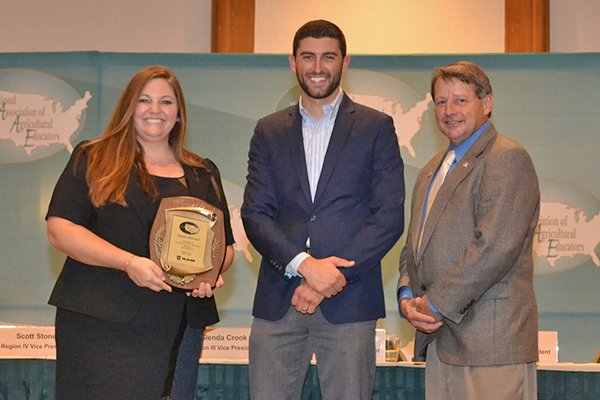
Future of agriculture
UD graduate Susan Mitchell prepares the next generation of agricultural leaders
9:13 a.m., Feb. 10, 2016--Growing up, University of Delaware graduate Susan Mitchell always swore that she would never be a teacher. Luckily for her and her students — the future generation of agricultural leaders that she teaches every day at Millsboro Middle School — she had a change of heart when she was in high school and got exposed to agriculture through her involvement with FFA.
“My entire family are teachers so I would always say, ‘I’m not doing this.’ I just wasn’t going to do it because my mom did it, but I ate my words pretty quickly,” said Mitchell, who now works in the same school district as most of her family members and was recently recognized as one of a select group of agriculture teachers nationwide who received the 2015 Teachers Turn the Key professional development scholarship.
Honors Stories
National Medal of Science
Warren Award
As a scholarship recipient, Mitchell attended the National Association of Agricultural Educators annual convention in New Orleans last November, an experience that she called “one of the coolest things that I’ve done in my professional career. I learned a lot and I brought back a lot. I picked up awesome skills and techniques that really helped me, specifically in class. I appreciate them for sending me.”
Time at UD
After initially heading to UD with the goal of becoming a veterinarian, Mitchell majored in animal and food sciences in the College of Agriculture and Natural Resources, but soon realized that she was drawn to the educational aspects of agriculture and added agricultural education in her junior year.
“I liked the fun, hands-on stuff because that’s what got me into it. I didn’t think I wanted to be in a school. Originally, I wanted to work at a zoo but after student teaching, I knew I wanted to be in the classroom and I knew I wanted to be in Delaware, which has a tight-knit agriculture community,” said Mitchell.
At Millsboro Middle, Mitchell got to start her own agriculture education program, which she has run for the past three years, establishing an FFA chapter in the process.
Mitchell, who is also a member of the Delaware Association for Agriscience Educators (DAAE) – the organization that nominated her for the Teachers Turn the Key scholarship – teaches two classes a day of each sixth, seventh and eighth graders. She gets 42 minutes with each group to try to provide them insight into agricultural issues and prepare them for studies at Sussex Central High School, which is Millsboro Middle’s feeder school.
“They start out with an introduction to agriculture and FFA as a sixth graders. It’s a lot of history and early agricultural practices and what agriculture is, and a lot of FFA leadership information,” said Mitchell.
The seventh grade class does an embryology project where they work in groups to hatch their own poultry eggs, a project that is set up like an agricultural science fair project.
“They weigh them every day, candle for a peek inside the shell to determine development and record the change in weight of the egg throughout the incubation period,” said Mitchell. “Is it going to increase, decrease or stay the same? That’s one part of the poultry unit, then they move onto plants, learning propagation techniques, flower anatomy, plant anatomy, and then we do some really cool food labs with them.”
The eighth graders learn about animal science, with goats and pigs brought in for live demonstrations and to teach the students about showmanship if they want to show an animal at the Delaware State Fair. They study cows during their dairy unit to learn about milk and ice cream, and they also evaluate the dairy cattle to determine the strongest and weakest in the group.
“The students can strut their stuff when they actually know the anatomy, and they can explain and choose the best dairy cow in the group,” said Mitchell.
Educating non-agricultural students
Some of the students have an agricultural background but not all, and Mitchell said there are fewer than she anticipated.
“A lot of them have goats but they’ve never participated at the fair, so that’s a whole new thing for them. I really try to get them into it because summer activities are part of what makes FFA so cool. It’s not just any September to June club. It’s way more. It’s definitely a lifestyle,” said Mitchell.
The importance of having agricultural education teachers for the next generation cannot be understated, Mitchell said, explaining that she gets to disseminate information from growers to those who are not as familiar with agriculture.
“I think it’s probably one of the most important careers right now because people don’t know where their food comes from in a time where there’s a lot of controversy over a lot of agriculture issues,” Mitchell said. “Agriculture educators are the middlemen. We bridge that gap where we can educate people without being super technical.”
She added it is important to do an outstanding job as an agricultural educator because “the generation that I teach are the ones who are going to come up with the new food laws and with the better technology and the better practices for agriculture.”
Offering advice to current undergraduates considering careers in teaching, Mitchell said it is important that they find a support system, which for her is DAAE and fellow agricultural educators.
“Don’t get discouraged. It can be stressful. Kids can be different every day and your attitude can be different every day, so you just need to remember the good days and plug through the bad ones,” she said. “It’s just like anything else you do. Sometimes it’s awesome and sometimes it’s not, but you just need to remember on those bad days why you love it.”
Article by Adam Thomas








